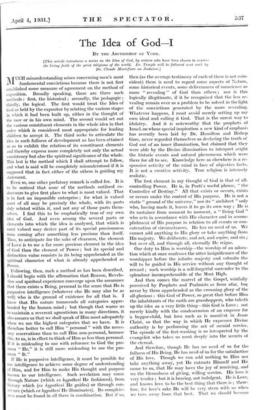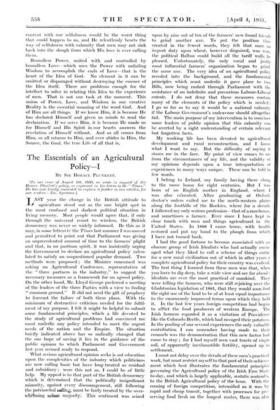The Idea of God —I
BY THE ARCHBISHOP OF YORK.
[This article introduces a series on the Idea of God, by writers who have been chosen to express the living faith of the great religions of the world. Dr. Temple will be followed next week by Dr. Claude Montefiore on Judaism.]
3/(UCH misunderstanding arises concerning men's most jj fundamental convictions because there is not first established some measure of agreement on the method of exposition. Broadly speaking, there are three such methods : first, the historical ; secondly, the pedagogic ; thirdly, the logical. The first would treat the Idea of God as held by the expositor by relating the various stages in which it had been built up, either in the thought of the race or in his own mind. The second would set out the various constituent elements in the whole idea in that order which is considered most appropriate for leading children to accept it. The third seeks to articulate the idea in such fullness of development as has been attained so as to exhibit the relation of its constituent elements and thereby express more completely not only the actual consistency but also the spiritual significance of the whole. This last is the method which I shall attempt to follow, and what is said will be completely misunderstood if it is supposed that in fact either of the others is guiding my statement.
Even so, one other prefatory remark is called for. It is to be noticed that none of the methods outlined en- deavours to give first place to what is most valued. That Is in fact an impossible enterprise ; for what is valued most of all may be precisely the whole, with its parts duly related within it, and not any of those parts them- selves. I find this to be emphatically true of my own idea of God. And even among the several parts or elements into which the idea is analysed, that which is most valued may derive part of its special preciousness from coming after something less precious than itself. Thus, to anticipate for the sake of clearness, the element of Love is to me a far more precious element in the idea of God than the element of Power ; but its special and distinctive value consists in its being apprehended as the spiritual character of what is already apprehended as Power.
Following, then, such a method as has been described, I should begin with the affirmation that Reason, Revela- tion and spiritual experience converge upon the assurance that there exists a Being, personal in the sense that He is purposive intelligence (whatever else He may also be as well) who is the ground of existence for all that is. I know that His nature transcends all categories appre- hended by the human mind ; but though that warns us to maintain a reverent agnosticism in many directions, it also assures us that we shall speak of Him most adequately when we use the highest categories that we have. It is therefore better to call Him " personal " with the neces- ,ary reservations than to call Him non-personal, because his, to us, is in effect to think of Him as less than personal. If it is misleading to use with reference to God the pro:. nom' " He," it is still more misleading to use the pro- noun " If He is purposive intelligence, it must be possible for our intelligence to achieve some degree of understanding of Him, and for Him to make His thought and purpose known to our intelligence. Such revelation may come through Nature (which ex hypothesi He fashioned), from history which (ex hypothesi He guides) or through con- science (which ex hypothesi He illuminates). Its complete- ness must be found in all three in combination. But if so, then (as the average testimony of each of these is not coin- cident) there is need to regard some aspects of Nature, some historical events, some deliverances of conscience as more " revealing " of God than others ; nor is this logically illegitimate, if it be recognized that the less re- vealing remain over as a problem to be solved in the light of the convictions generated by the more revealing. Whatever happens, I must avoid merely setting up my own ideal and calling it God. That is the surest way to idolatry. And it is noteworthy that the prophets of Israel, on whose special inspiration a new kind of emphasis has recently been laid by Dr. Hamilton and Bishop Gore, never regarded themselves as declaring the truth of God out of an inner illumination, but claimed that they were able by the Divine illumination to interpret aright the historic events and natural phenomena which were there for all to see. Knowledge here as elsewhere is a re- sponsive activity of the mind in face of objective facts. It is not a creative activity. True religion is intensely realistic.
The first element in my thought of God is that of all- controlling Power. He is, in Pratt's useful phrase, " the Controller of Destiny." All that exists or occurs, exists or occurs under the control of His purpose. He is not a static " ground of the universe," nor its " architect " only who, having made it, leaves it to go its own way ; He is its sustainer from moment to moment, a " living God " who acts in accordance with His character and in accom- plishment of His purpose in relation to all events or con- catenation of circumstances. He has no need of us. We cannot add anything to His glory or take anything from His majesty. We deliberate, and act, and aspire, and sin ; but over all, and through all, eternally He reigns.
Our duty to Him is worship—the worship of an adora- tion which at once confesses the utter insignificance of the worshipper before the infinite majesty and submits the will. to be guided in His service without any thought of reward ; such worship is a self-forgetful surrender to the splendour incomprehensible of the Most High.
And then comes the marvel of the Gospel, wistfully perceived by Prophets and Psalmists as from afar, but never by them apprehended as the crowning glory of the all-glorious :. this God of Power, so great that before Him the inhabitants of the earth are grasshoppers, who taketh up the isles as a very little thing—this God is Love ; not merely kindly with the condescension of an emperor for a beggar-child, but love such as is manifest in Jesus Christ, so that the way in which He expresses Divine authority is by performing the act of menial service. The episode of the feet-washing is so interpreted by the evangelist who takes us most deeply into the secrets of the eternal.
And therefore, though He has no need of us for the fullness of His Being, He has need of us for the satisfaction of His love. Though we can add nothing to Him nor take anything away, yet He entrusts Himself and IIis cause to us, that He may have the joy of receiving, and we, the blessedness of giving, willing service. His love is very tender ; but it is bracing, not indulgent. He is Love, and knows love to be the best thing that there is ; there- fore, for love's sake He will be very stern with us when We turn away from that best. That we should become content with our selfishness would be the worst thing that could happen to us, and He relentlessly besets the way of selfishness with calamity that men may not sink back into the slough from which His love is ever calling them.
Boundless Power, united with and controlled • by boundless Love—which uses the Power with unfailing Wisdom to accomplish the ends of Love—that is the heart of the Idea of God. No element in it can be omitted or disparaged without destroying the essence of the Idea itself. There are problems enough for the intellect to solve in relating this Idea to the experience of men. That is not our task at the moment. This union of Power, Love, and Wisdom in one creative Reality is the essential meaning of the word God. And of Him are all things. If we know Him, it is because He has declared Himself and given us minds to read the declaration. If we serve Him, it is because He made us for Himself and His Spirit in our hearts answers the revelation of Himself without. And as all comes from Him, so all returns to Him, and ever abides in Him, the Source, the Goal, the true Life of all that is.









































 Previous page
Previous page